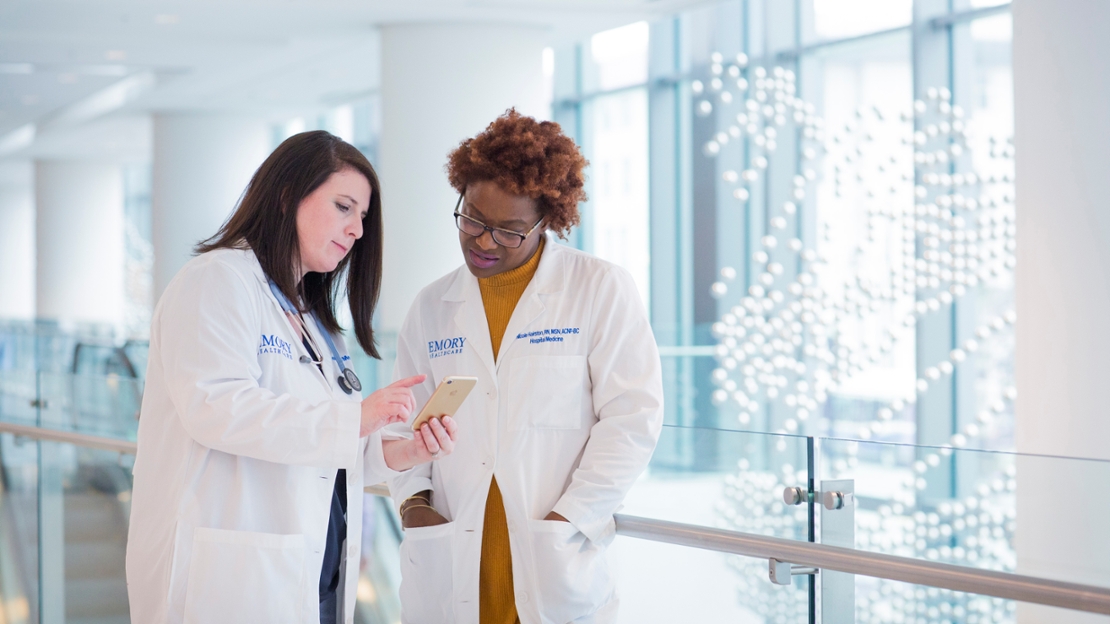Emory's internal medicine Primary Care Track is a three year program that produces outstanding general internists who want to excel in careers in academic medicine and primary care.
Program Overview
Emory's primary care track produces outstanding general internists who are prepared for professional careers in clinical practice, as clinician-educators, or in research. Our graduates excel in caring for medically underserved patients and marginalized communities. More than 200 graduates are currently practicing across the country in careers as diverse as palliative medicine, geriatrics, academic General Internal Medicine (GIM), Indian Health Service, and in private practices in urban, suburban and rural settings.
As a smaller program housed within the larger residency program, our primary care residents rotate through their ambulatory blocks together as a class, emphasizing peer learning and collaboration while forming a tight community.
Our residents practice in an X+Y model with fully separate inpatient (X) and outpatient (Y) rotations. Primary care interns follow a 4+1 model, and PGY 2s and 3s follow a 4+4 model, with six Y blocks in the second year and seven in the third.
Curricular Goals
PGY-1
The primary care track intern year is similar to the categorical track with the exception that primary care interns have 2 additional Y weeks. Time spent on inpatient service (general wards and subspecialty consults) builds a strong foundation in acute care while outpatient experiences focus on expanding medical knowledge in common outpatient diseases. All primary care interns have their continuity clinic practice at Grady Memorial Hospital. The continuity clinic experience focuses on common outpatient issues such as diabetes, hypertension, and musculoskeletal complaints. Didactics on core clinical topics and learning to critically appraise literature solidify this experiential knowledge.
PGY-2
In the second year of the primary care track, residents select a second site continuity clinic to further strengthen their bedside ambulatory skill set and expose them to patient populations in a new setting. During Y blocks, residents rotate through a variety of outpatient subspecialty clinics to develop their breadth of knowledge of the management of conditions in the ambulatory setting. The second year focuses on formalizing teaching and leadership skills as well as exposing residents to the wide variety of career paths in general internal medicine. Didactics include ambulatory topics, health policy and advocacy, and careers in general internal medicine. Second year residents engage in service learning through service projects completed during Y blocks. Second year residents are also responsible for leading primary care journal club, and under mentorship, submitting a clinical vignette or research abstract to the Society of General Internal Medicine annual academic meeting.
PGY-3
Third year residents finalize their individual learning goals in preparation for their future career as well as enhance their teaching skills with delivery of senior talks to their cohort during an ambulatory block. Didactics include talks on practice management and business of medicine concepts to prepare them for their future career. Residents continue in their primary and secondary continuity clinics, solidifying longitudinal relationships with patients, as well as rotating in a variety of outpatient subspecialty clinics and continuing to engage in service learning. Senior residents also coordinate our “Eat, Pray, Love” professional development series, an informal dinner where general internal medicine faculty share lessons learned from their career path.
Sample PGY2/3 Y Block Week
|
|
Monday |
Tuesday |
Wednesday |
Thursday |
Friday |
|
AM |
Grady Primary Care Clinic |
Primary Care Curriculum |
Specialty Clinic |
Grady Primary Care Clinic |
Second Site Primary Care Clinic |
|
PM |
Grady Primary Care Clinic |
Administrative Time |
Specialty Clinic |
Specialty Clinic |
Second Site Primary Care Clinic |
Rotation Curriculum
|
Rotation (weeks) |
PGY1 |
PGY2 |
PGY3 |
|
Ambulatory |
12 |
23 |
23-25 |
|
Medicine Wards |
18-22 |
8 |
4-5 |
|
Hurst Cardiology Wards |
4 |
0 |
0 |
|
ICU |
3-6 |
4-6 |
4-5 |
|
Night Float |
0 |
4 |
4-5 |
|
Subspecialty Inpatient Consults* |
2-3 weeks |
0 |
6 weeks |
|
Emergency Room |
0 |
2 |
0 |
|
Palliative Care |
2 |
0 |
0 |
|
Procedure/Point of care Ultrasound |
1-2 |
Opportunity for elective |
Opportunity for elective |
|
Palliative Care |
2 |
0 |
0 |
|
Special Immunology Service (SIS) |
0 |
2 |
0 |
|
Inpatient Selective |
0 |
0-2 |
0 |
|
Geriatrics |
0 |
Embedded in Y weeks |
0 |
|
Neurology |
0 |
0 |
4 |
|
Elective (Research or Clinical) |
0 |
2-4 |
2-4 |
|
Global Health Distinction** |
0 |
4 |
4 |
*Subspecialty consults include Gastroenterology, Nephrology, Infectious Diseases, and Pulmonology.
**These experiences are for residents completing the global health distinction.
Details on Benefits and Annual Stipends
For more information on benefits and annual stipends, click the button below.
"The strongest aspect of our Primary Care Track is that it brings together residents with different interests and experiences who share the same overarching analysis: patient care does not begin and end at the clinic door. This fact underlies our discussions, readings, research, and informs the solutions we seek for a more just and equitable healthcare system. The additional time spent in our primary care continuity clinic enables us to hone our outpatient medical skillset in order to best address the challenges our patients face. It is through these patient relationships that we are collectively inspired to become not simply better doctors, but stronger community members and advocates."
- Mark Spencer, Class of 2023


